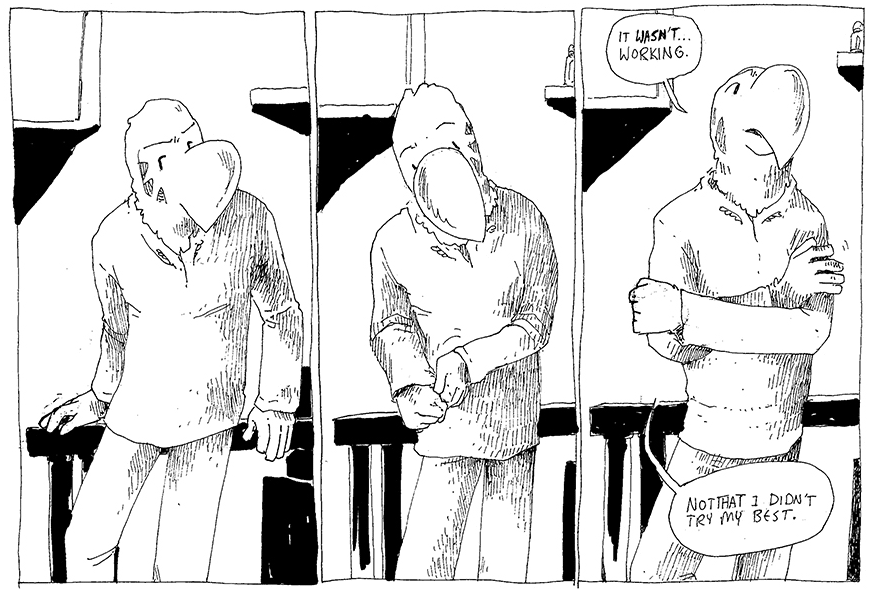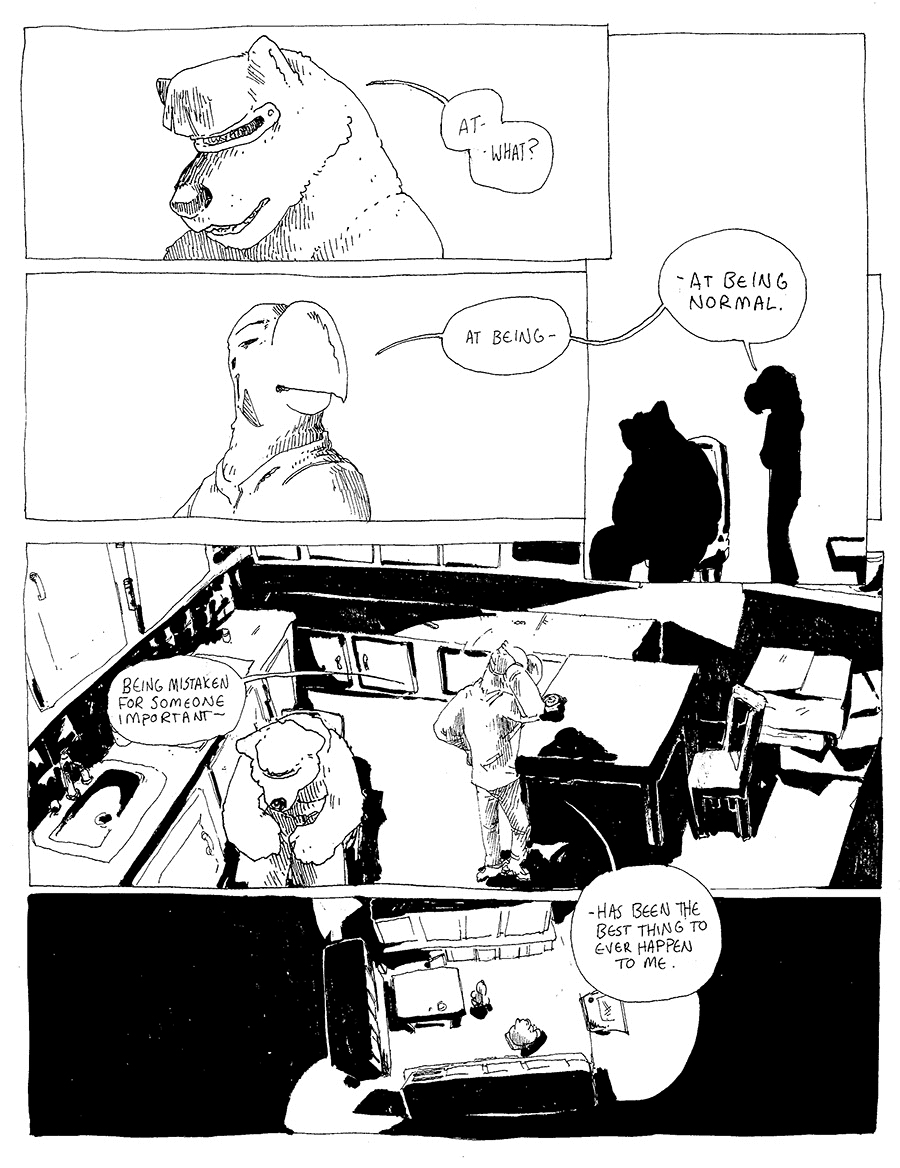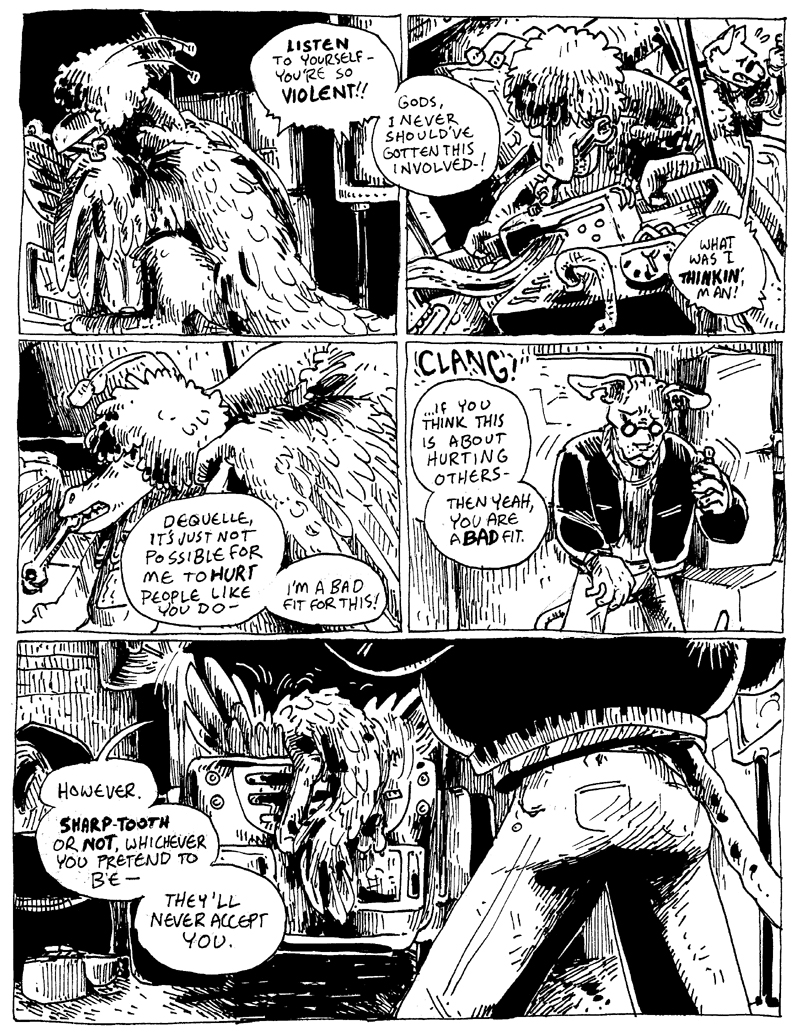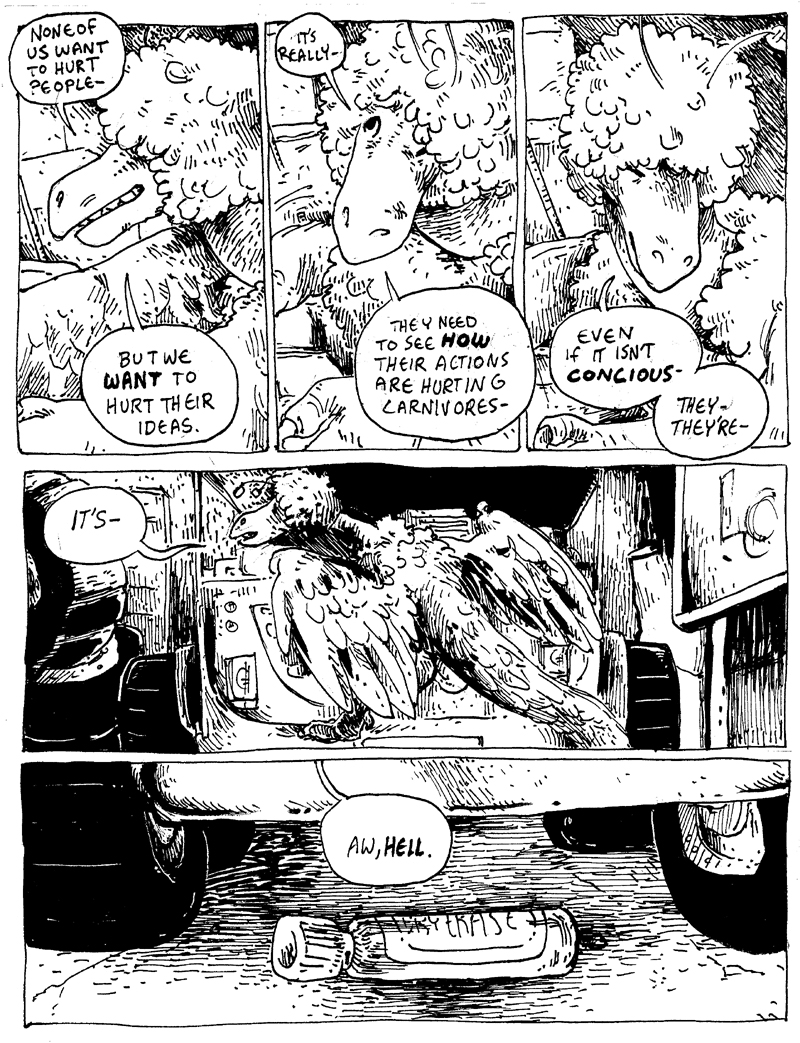I think there was some interview Burial did at one point where he mentioned fantasizing about tying himself up in a trash bag and letting the garbage truck carry him far away. It’s hard to google, like, “Burial quote” or “Burial trash bin” without just getting results for stuff related to funerals and waste management, though. Ah well.
Carnivore Planet is a comic written and illustrated by Nero O’Reilly. The first page of the comic was posted online in 2013. It was most recently updated in either 2017 or 2018 depending on who you ask. The page that used to host the comic (he managed to snag the fantastic url carnivorepla.net for the project) is down now and is only accessible through archiver sites. The last upload there is from January 9th, 2017. However, a self described “very unfinished non-ending” was posted to the artist’s Patreon on April 13th, 2018.
The comic is missing an ending. None of the narrative threads introduced are properly resolved, and several of the characters are left dangling in precarious circumstances. Don’t get confused. Carnivore Planet is an incredible body of work.

The whole thing’s hand inked. Any random interior panel provides enough detail to map out a brief history of the location and to characterize whoever lives there. It’s the gold standard for dystopian sci-fi worldbuilding in my head.
Beyond the artwork, I’d argue that Carnivore Planet contains a fully realized narrative despite its “non-ending.” I don’t want to cover the full thing here. It’s about 200 pages and is really worth a read. Part of it’s only readable through the Wayback Machine, though after a while, the html fucks up and makes a lot of the panels impossible to read. The back half of the comic is available to download in HD via the artist’s Patreon, though, which I’ll link at the bottom of the article.
Instead of a full retrospective, I want to focus on one particular character, and the dilemma, or lack thereof, he finds himself in.

Carnivore Planet follows a group of anarchist eco(bio?)terrorists’ attempt to hold a high ranking government official hostage for ransom. The comic opens on the hostage in question, Rocco, being baited into a bar to sign some phony paperwork by Lazarus, the leader of the terrorist group and getting a bag thrown over his head. Lazarus is initially under the impression that Rocco is a high prince, and that they’ll be able to drive a high price for his livelihood. However, Rocco eventually tells the group that they’re mistaken, and that he’s nothing more than an assistant secretary in a bureaucratic office.
Rocco’s a really charming character. It’s good to start with me saying that I like him a lot, I think. He’s something of a fruit and is quick to startle at points, but he’s honest, hard working, and easy to talk to. He keeps a positive attitude as long as it’s realistic to do so.

Actually, the only notable delineation between the various species of furrys [sic] in Carnivore Planet is that all of the bird dudes are a bit fruity.

It’s great, I love it.
Rocco’s relationship to the group is strange. There is never a point where he is not thoroughly kidnapped. At no point during the comic is Rocco informed he is free to leave. He even halfheartedly attempts to escape at one point, though he doesn’t manage to escape the compound of abandoned buildings and scrap metal the group lives in.
Despite this, Rocco never seems particularly distressed by his captivity. The choice to kidnap Rocco was something Lazarus did without consulting the rest of the group, and the other two people living on the compound are kinda at a loss as to what to do with him. Minutes after he’s dropped off, one of the other men, Toby, is preparing him a bagel sandwich, and they’re trading personal information like old people meeting each other on vacation.
Rocco is provided with reasonable housing, food, and toilet by the group throughout the comic. In exchange, he is expected to remain on the compound until he is released. Rocco’s eventually put in charge of performing janitorial duties around the living quarters. Turns out, he has a knack for it.
We’re never given any scenes of Rocco being depressed about his captivity. Inversely, he quickly forms friendships with his kidnappers, bonds that develop too quickly and willingly to write off as irrational via pop psychology. Carnivore Planet is fortunately not about Stockholm syndrome.
(Tangent, but the only groups that have ever diagnosed people with “Stockholm syndrome” are dubious media outlets and teenagers on Tik Tok. The condition is dreadfully under researched, and a lot of the research that does exist is either out of date or weirdly misogynistic. If you would like to argue with me about this, DM me.)

Even during Rocco’s attempted escape, he halts by his own fruition. He pauses to admire the landscape of the desert in the hallway, effectively allowing Lazarus to catch him. It reads more as him testing out the possibility of escaping than making any sort of earnest attempt to do so. He tests the membrane of his enclosure like he’s trying on clothes.
In that same scene, Rocco informs the group that he is not, in fact, the high ranking official that Lazarus thought he was, which in itself is a strange gesture. Rocco doubles over laughing when he realizes who they think he is. He makes no attempt to strategically conceal his identity. He’s not laughing at the group either. A moment later, he’s calmly explaining the intricacies of his duties, and discussing with the group what circumstances may have led to the mix-up.
At one point, Lazarus informs Rocco that his government has a pretty good read on where he is. Rocco immediately tells Lazarus that he doesn’t want to go back.


Rocco’s work as an assistant secretary was exhausting, boring, and constant. Rocco does not cite his kidnapping as something exciting, a brief change of pace. He speaks of his captivity as an alternative, the first way of life he’s ever felt properly equipped for.
This on its own is a solid character arc. Rocco is never hysterical. After his initial abduction, he is never victimized. Rocco does not magically transform into a starry eyed radical, either. He forms an allegiance to the group’s radical cause through a slow process of acclimation and participation. He is never in over his head. He makes a series of rational choices based on his situation and decides that he is comfortable where he is.
Even in the sequence of his attempted escape, the one brief instance of his free will being actively prohibited, Rocco wields his identity as a counter-intelligence, and concludes the scene in equilibrium with his captors. There are constantly power dynamics at play within Rocco’s relationship to his kidnappers, but they are dynamics that are intensely interrogated by the text, and are dwarfed by the more pressing dynamics between the state and the radical groups the text follows.

Rocco on his own functions as a wonderful character study, but his presence becomes more interesting when pitted against Lazarus and how he views his lifestyle.
Carnivore Planet possesses a tact that a lot of “cool terrorists against capitalism” stories lack (no offence intended to “cool terrorists against capitalism” stories). The story does not revolve around the aesthetic pleasures of a well executed scheme or mass mobilization. There’s a special emphasis placed on the waiting, the tensions within organizing groups, the spaces between actions.
Cyborgs are an understood part of Carnivore Planet’s universe. Most of the main cast has some form of cybernetic augmentation. Rocco, notably, is fully natural. These augmentations are never introduced as sci-fi gadgets, however. If anything, the text almost always references the way these devices malfunction. Lazarus’s viser doesn’t give him super-sight capabilities, he needs it, or else he won’t be able to see. Archie’s steam-powered shell doesn’t give him super strength, he needs it, or else he won’t be able to move.
These people’s bodies can’t function unless they are given constant attention and repair. It’s also worth noting that Carnivore Planet’s universe is an explicitly capitalist one, and that most of the main cast is poor. Rocco is, again, an exception to this. His very shitty job made him a lot of bank.
It is therefore necessary for cyborgs to maintain an active relationship with society at large. Without maintaining some form of dialogue with their world’s broader industrial powers, they will not be able to acquire the tools necessary for their survival. However, this dialogue is predicated on financial exchange, and if these cyborgs are unable to provide this universe’s industrial powers with sufficient financial compensation, they’ll be left out to dry, and may have to take drastic actions to survive. They can’t advertise. Nobody’s advertising to them.

Their existence, in this way, is first discernable in opposition. They’re identified by their struggle before anything else. This isn’t even really a deep dive into the story’s themes, either. It’s all pretty explicit in the text. Most dystopian sci-fi involving cybords hints as a broader allegory relating to capitalist healthcare systems, but Carnivore Planet goes pretty deep into the nitty gritty of the ordeal.
The frustrations of the anarchist groups in the text are constantly justified, and their actions are generally framed as logical reactions to their circumstances. Rocco isn’t held for ransom because Lazarus and his group are greedy or lazy. Rocco’s kidnapped for the same reason Lazarus has to do most things. Laz ran away from home at a very young age. He’s lived off the grid for so long that the government has stopped manufacturing the parts he needs to survive. He’s scalvanging, and he’s mad.

Being mad only gets him so far, though. The media of the nation he’s in isn’t going to do sympathetic reporting on a kidnapping. There’s a number of scenes that feel rather hopeless on their own. There’s one notable scene near the middle of the comic that mostly consists of a separate group of radicals fretting over how inconsequential a lot of their activities feel.


Laz himself discusses at length how impulsive a lot of his actions are, including the choice to kidnap Rocco in the first place. He says he wouldn’t wish his life or his brain onto anybody else. Why, then, does Rocco prosper in exactly the conditions Lazarus describes?
This could technically be attributed to any number of factors. Rocco hass likely gotten more socialization during his time with Laz’s group than he has at most other points in his life. He’s also deeply invested in his labor. Rocco’s work on the compound has tangible consequences. He is not a part of a larger bureaucratic machine. He can comprehend the job of a plumber more intuitively than that of an assistant secretary. He sets out to repair a pipe, and when he finishes, water flows where it didn’t before.

However, the biggest contributing factor to Rocco thriving in captivity might be that his life after his kidnapping isn’t too fundamentally different to his life before.
Laz’s groups’ intrinsic opposition to the state is treated by the governing powers as an affront on every single one of the state’s governing principles. Rocco’s kidnapping sends the nation at large into a frenzy in a way that the broader economic disparities that made the kidnappers need money to survive in the first place didn’t. The nation’s media attempts to form a strict dichotomy between the kidnappers and the governing bodies of the state. Rocco’s well being is never the government’s primary object.
The kidnappers are framed as invaders, people entirely separate from the prevailing government bodies who pose a sort of spiritual threat to their way of life. Therefore, it is necessary for the state to frame their actions as an attack on the public’s way of life.
Furthermore, Rocco’s absence is one we view only through the lens of the government powers who have a vested interest in the protection of their sovereignty. Rocco father, the only person who shows particular worry for Rocco’s livelihood, is still a government employee, and considers his obligation to protect his son at least partially in the interest of state power. It’s loosely implied that Rocco only got his job via nepotism. Rocco doesn’t mention his father at all.
Rocco doesn’t change much, though. Rocco’s experiences throughout the text are all rather casual. He is the example given of a capitalist being forced to live in a prototype of an anarchic society. Despite this radical shift in his lifestyle, he himself doesn’t change in any extreme way. He talks about his time on the compound in positive terms, and it’s implied that it’s changed his outlook on a lot of things, but it’s never implied that his experiences have made him into a completely new person.
The action of being kidnapped is familiar to Rocco. He was forced to live places he didn’t want to live before, doing things that he didn’t want to do. In this way, Rocco’s kinda the perfect foil to Laz’s melodrama. Rocco’s the control group. Things that seem hopeless to Laz, changes impossibly large to ask for, don’t feel like much at all to Rocco. Rocco’s happier.

I wish I could talk a bit here about how this tension resolves, but like I said, this story has a non-ending. Not even in the sense that it has a hasty conclusion, it really just kinda stops at a certain point. Again, I mean this in no way to the comic’s detriment. O’Reilly’s gone on to work on a number of fantastic projects after Carnivore Planet concluded production, and during its run, it created a massive living universe that it used to its fullest potential.
I don’t want to get caught up in the gunk here, Carnivore Planet is a ton of fun to read, and it’s definitely worth the hassle to track down a copy. Rocco’s role in the story is only one part of that fantastic narrative web.
Rocco was the character that resonated the most with me when I last reread it, though. It’s good to be reminded that it’s possible to go somewhere else, or do different things. It’s also good to be reminded that most of the people who say that it’s impossible to do different things have lived under one system of power their entire lives. There’s ways to be kidnapped. There’s ways to move around, and that’s easy to forget a lot of the time. I really needed someone to say what Carnivore Planet did when I read it. It focuses on a group of characters that really feel good to focus on. It’s important to track these interactions. It’s an elixir to ward off claustrophobia.

His website
His patreon
